
The La Pointe Light is a lighthouse located on Long Island, one of the Apostle Islands, in Lake Superior in Ashland County, Wisconsin, near the city of Bayfield.
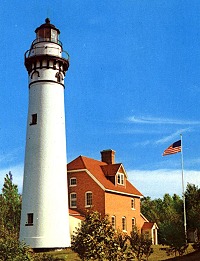
The Outer Island lighthouse is a lighthouse located on the northern tip of Outer Island, one of the Apostle Islands, in Lake Superior in Ashland County, Wisconsin, near the city of Bayfield.
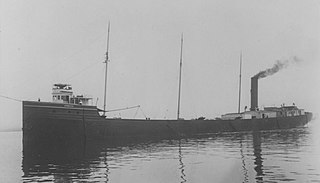
SS Appomattox was a wooden-hulled, American Great Lakes freighter that ran aground on Lake Michigan, off Atwater Beach off the coast of Shorewood, Wisconsin in Milwaukee County, Wisconsin, United States in 1905. On January 20, 2005 the remnants of the Appomattox were listed on the National Register of Historic Places.
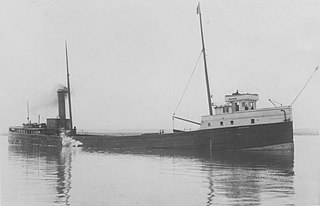
The SS Marquette was a wooden-hulled, American Great Lakes freighter built in 1881, that sank on Lake Superior, five miles east of Michigan Island, Ashland County, Wisconsin, Apostle Islands, United States on October 15, 1903. On the day of February 13, 2008 the remains of the Marquette were listed on the National Register of Historic Places.
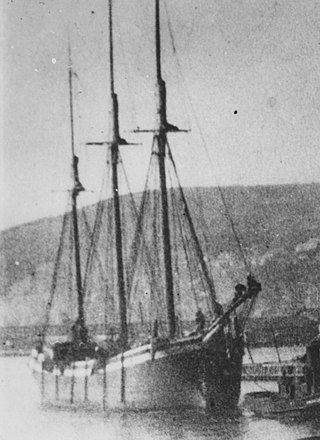
Samuel P. Ely is a shipwreck in Two Harbors, Minnesota listed on the National Register of Historic Places. It was a schooner that sailed the Great Lakes carrying iron ore, coal, and other bulk freight. It was built in 1869 and was a fairly typical example of the 200-foot schooner built in the 1870s, though she was reinforced for the demands of carrying iron ore.

SS M.M. Drake was a wooden steam barge that towed consorts loaded with coal and iron ore on the Great Lakes. She came to the rescue of the crews of at least four foundering vessels in her 19-year career only to meet the same fate in her final rescue attempt. Drake sank in 1901 off Vermilion Point after a rescue attempt of her consort Michigan. Her rudder, anchor, and windlass were illegally removed from her wreck site in the 1980s. They are now the property of the State of Michigan. The rudder is on display as a loan to the Great Lakes Shipwreck Museum and the anchor and windlass are on loan for display to Whitefish Township Community Center. The wreck of Drake is protected as part of an underwater museum in the Whitefish Point Underwater Preserve.

Northerner was an 81-foot-long (24.7-meter-long), two-masted schooner. She sank in Lake Michigan on November 29, 1868, five miles southeast of Port Washington, Wisconsin, United States. The bottom of the ship lies under 130 feet of water.

Lucerne was a commercial schooner. In November 1886, she sank due to bad weather in Lake Superior, off Long Island in Chequamegon Bay. The site of the wreck was added to the National Register of Historic Places in 1991.
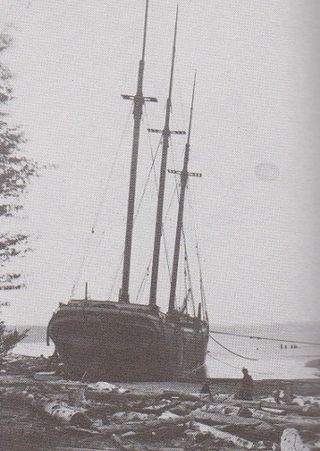
The Moonlight was a schooner that sank in Lake Superior off the coast of Michigan Island. The wreckage site was added to the National Register of Historic Places in 2008.
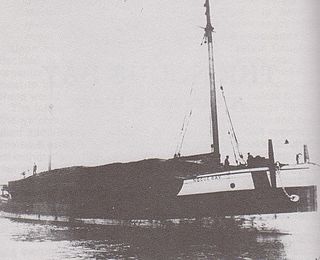
Noquebay was a wooden schooner barge that sank in Lake Superior in Chequamegon Bay off Stockton Island. The wreck site was added to the National Register of Historic Places in 1992.

The Ottawa was a tugboat that sank in Lake Superior off the coast of Red Cliff in Russell, Bayfield County, Wisconsin. The wreckage site was added to the National Register of Historic Places in 1992.

Sevona was a steel-hulled lake freighter that sank in Lake Superior off the coast of Sand Island in Bayfield County, Wisconsin, United States. The wreckage site was added to the National Register of Historic Places in 1993.

Home was a two-masted schooner which sank in Lake Michigan off Centerville in Manitowoc County, Wisconsin, United States, in 1858. In 2010 the shipwreck site was added to the National Register of Historic Places.

T. H. Camp was a wooden tugboat, operated by the Booth Packing Company of Bayfield, Wisconsin. On November 16, 1900, she sank in Lake Superior, between Madeline and Basswood Islands. The site of the wreck was added to the National Register of Historic Places in 2004.

City of Ashland was a sidewheel paddle steamer that sank in Chequamegon Bay, Lake Superior, off Ashland, Wisconsin. The ship was named for Ashland, a port community. The wreckage remains at the bottom of the bay, close to the ship's namesake city.

SS Robert Wallace was a wooden-hulled American bulk freighter that served on the Great Lakes of North America from her construction in 1882 to her sinking in 1902 on Lake Superior near the town of Palmers, St. Louis County, Minnesota, United States. On November 17, 1902 shortly after leaving Superior, Wisconsin with a cargo of iron ore, Robert Wallace sprang a leak and sank. Her wreck was found in 2006, and on October 14, 2009, the wreck of Robert Wallace was listed in the National Register of Historic Places.

Australasia was a wooden-hulled American Great Lakes freighter that served on the Great Lakes of North America between her construction in 1884 to her burning and sinking in 1896. On October 18, 1896, while loaded with coal, the Australasia sank in Lake Michigan near the town of Sevastopol, Door County, Wisconsin, United States, after burning off Cana Island. On July 3, 2013, the wreck of the Australasia was added to the National Register of Historic Places.
The following index is provided as an overview of and topical guide to Wikipedia's articles on recreational dive sites. The level of coverage may vary:

SS Selah Chamberlain was a wooden-hulled Great Lakes freighter that sank in Lake Michigan in 1886, 6 miles (10 km) off the coast of Sheboygan, Sheboygan County, Wisconsin, United States after being rammed by the steamer John Pridgeon Jr. with the loss of five lives. On January 7, 2019, the wreck of Selah Chamberlain was listed on the National Register of Historic Places, and was given the reference number 100003288. She was the first shipwreck listed on the National Register of Historic Places in 2019.

Robert C. Pringle, originally named Chequamegon, was a wooden-hulled American tugboat that sank without loss of life on Lake Michigan, near Sheboygan, Wisconsin, on June 19, 1922, after striking an obstruction.





















